SB 905 establishes a regulatory framework for carbon removal and carbon capture, utilization, and sequestration.
- SB 905 requires the California Natural Resources Agency, in consultation with the California Public Utilities Commission to "provide a proposal to the Legislature to establish a state framework and standards for the design, operation, siting, and maintenance of intrastate pipelines carrying carbon dioxide fluids of varying composition and phase to minimize the risk posed to public and environmental health and safety,” by February 1, 2023. (Public Resources Code 71465 (b), Completed)
- SB 905 requires the California Natural Resources Agency, in consultation with the California Air Resources Board to “publish a framework for governing agreements requiring two or more tracts of land overlying the same geologic storage reservoir or reservoirs for purposes of managing, developing, and operating a carbon dioxide capture, removal or sequestration project” by July 1, 2025. (Public Resources Code 71461(a), In Progress)
- SB 905 requires the Department of Conservation’s California Geological Survey to develop a Geologic Carbon Sequestration Group (GCSG) tasked with providing independent expertise and regulatory guidance to the California Air Resources Board. Tasks of the GCSG include the assessment of (Public Resources Code 2213 (a-b), In Progress):
- High quality, suitable locations for Class VI injection wells (Class VI is the US EPA designation for wells used to inject CO2 into deep rock formations for purposes of long-term sequestration).
- Appropriate subsurface monitoring to ensure geologic sequestration of injected carbon dioxide.
- Hazards that may require the suspension of carbon dioxide injections.
- In addition, the State Geologist shall report seismic activity or [subsurface] leakage of carbon dioxide from a carbon dioxide capture, removal, or sequestration project to the state board and may recommend changes in the operations of the project to the state board. (Public Resources Code 71463, In Progress)
Interested Parties List
To be added to the interested party listserv to receive additional information and announcements regarding the SB 905 Implementation effort, please send a request for subscription to: Comments@conservation.ca.gov.
Materials from the August 15, 2023 Overview of SB 905
- Recording of Meeting, August 15, 2023 at 10 am
- Recording of Meeting, August 15, 2023 at 5:30 pm
- Presentation by the California Air Resources Board
- Presentation by the California Natural Resources Agency & Dept of Conservation
- Presentation by the California Geological Survey
- Presentation by the California Energy Commission
Pipelines Regulations
SB 905 establishes a regulatory framework for carbon removal and carbon capture, utilization, and sequestration (CCS). Among other things, SB 905 requires the California Natural Resources Agency, in consultation with the California Public Utilities Commission, to "provide a proposal to the Legislature to establish a state framework and standards for the design, operation, siting, and maintenance of intrastate pipelines carrying carbon dioxide fluids of varying composition and phase to minimize the risk posed to public and environmental health and safety,” by February 1, 2023.
- SB 905: Proposal for Establishing State Framework and Standards for CO2 Pipeline Regulations
- Presentation SB 905 First Listening Session January 19
Other Resources
- U.S. EPA CCS Project Applications in California
- U.S. EPA Class VI Injection Information
- California Air Resources Board 2022 Scoping Plan Update
- California Geological Survey, Geologic Carbon Sequestration
SB 846 authorizes the extension of operating the Diablo Canyon Nuclear power plant (Diablo Canyon) beyond the current expiration dates (2024 for Unit 1 and 2025 for Unit 2), to up to five additional years (no later than 2029 and 2030, respectively), under specified conditions. It also identifies actions needed to enable the extension of Diablo Canyon beyond 2025 if it is needed to support grid reliability. SB 846 tasks the California Natural Resources Agency (CNRA) with the following actions:
- By January 31, 2023, the CNRA must provide a detailed description and plan to the Joint Legislative Budget Committee that identifies all actions necessary for extending Diablo Canyon.
- At least 30 days prior to issuing any permit, lease, license, certification, concurrence, plan, decision, or other approval, the CNRA shall facilitate a public process to consider public input concerning the environmental impacts and mitigation of extended operations of Diablo Canyon.
- By 3/23/23, the CNRA must submit a Land Conservation and Economic Development Plan to the Joint Legislative Budget Committee.
- The CNRA Secretary and CalEPA Secretary shall ensure coordination and prioritization of review of applications.
February 10: Informational Listening Session Relating to the Diablo Canyon Power Plant Pursuant to SB 846
The California Natural Resources Agency (CNRA), with the participation of the Governor’s Office of Business and Economic Development (GO-Biz), California State Lands Commission (CSLC), California Public Utilities Commission (CPUC), California Coastal Commission (CCC), and the State Water Resources Control Board (Water Board), invites the public to attend a listening session on February 10, 2023, related to CNRA’s required actions under Senate Bill 846 (Dodd, 2022).
Friday, February 10, 2023
9:00 AM – 3:30 PM
In person at:
County Government Center
Board of Supervisors Chambers
1055 Monterey Street
San Luis Obispo, CA 93408
Remote Access via Zoom: Please register in advance at Webinar Registration - Zoom.
Oil and Gas regulation in California has undergone extensive reform across multiple agencies to strengthen protections for fresh groundwater aquifers and public health and safety. The Natural Resources Agency has been given a statutory role in implementation of Senate Bill 4 (Pavley 2013) for well stimulation and Senate Bill 83 (Committee on Budget and Fiscal Review 2015) for underground injection programs. These activities are directed to strengthen the program’s reliance on best available science and provide public input into the regulatory programs at the Department of Conservation and The State Water Resources Control Board.
Reform Initiatives
SB 83 Independent Review Panel for the Department of Conservation’s Underground Injection Control Program
What's New?
The State of California is implementing extensive reforms to its regulation and oversight of oil and gas production to increase protections for fresh water aquifers, public health and safety. Production from California’s oil fields due to the extensive history of production as well as the type of oil in the geologic formations, is largely dependent upon enhanced oil recovery techniques such as the injection of steam or water to induce production from oil reservoirs. Additionally, the state’s oil reserves naturally contain a substantial amount of briny water, called produced water, that comes up along with the oil through production wells. This water is disposed of after it is separated from the oil via injection wells. Enhanced oil recovery and produced water disposal are regulated by the Department of Conservation’s Division of Oil, Gas and Geothermal Resources’ Underground Injection Control Program. Through public processes and legislative actions, the Department has been working over the course of several years to strengthen both the regulatory structure of the program and the staffing resources available to review oil production activity.
Pursuant to Senate Bill 83 (Committee on Budget and Fiscal Review, Chapter 24, Statutes of 2015), the Secretary of the Natural Resources Agency and the Secretary for Environmental Protection have appointed an independent review panel to evaluate the regulatory performance of the administration of the Program and make recommendations on how to improve its effectiveness by evaluating resource needs, statutory or regulatory changes, as well as program organization.
Following the requirements of the legislation, the panel is comprised of a diverse group of individuals with expertise and scientific background in geology, toxics, oil and gas industry, public health, and the environment, as well as representatives from agricultural and environmental justice perspectives.
Additionally, the SB 83 Panel is required to seek input from a broad range of stakeholders with a diverse range of interests affected by state policies and the general public.
What the Panel will do
- Observe, comment on, and review a Peer Review conducted by the Ground Water Protection Council (GWPC), a nonprofit organization whose members consist of state ground water and UIC regulatory agencies.
- Seek input on the findings of the Peer Review from a broad range of stakeholders and the public.
- Issue an independent final evaluation and recommendations to improve the regulatory program.
The Panel’s discussions and process will be facilitated by the Lawrence Berkeley National Laboratory.
Panelists
Andrew Grinberg
 Andrew Grinberg is National Campaigns Special Projects Manager for Clean Water Action, where he works on federal and state policy and campaigns. He began working with CWA in 2006, and has filled a number of roles within the organization. Andrew helped establish CWA's California oil and gas program in 2011, and has led statewide regulatory and legislative efforts related to produced water disposal in sumps, underground injection control, well stimulation, and chemical disclosure. Grinberg has a Bachelor of Arts in Urban and Environmental Policy from Occidental College, and is currently enrolled in Georgetown University's Masters of Urban and Regional Planning program.
Andrew Grinberg is National Campaigns Special Projects Manager for Clean Water Action, where he works on federal and state policy and campaigns. He began working with CWA in 2006, and has filled a number of roles within the organization. Andrew helped establish CWA's California oil and gas program in 2011, and has led statewide regulatory and legislative efforts related to produced water disposal in sumps, underground injection control, well stimulation, and chemical disclosure. Grinberg has a Bachelor of Arts in Urban and Environmental Policy from Occidental College, and is currently enrolled in Georgetown University's Masters of Urban and Regional Planning program.
Briana Mordick
 Briana Mordick is a Senior Scientist for the Nature and Climate & Clean Energy Programs at the Natural Resources Defense Council. Trained as a geologist, Ms. Mordick works as a technical advisor on a variety of issues related to oil production, natural gas production, and the geologic sequestration of carbon dioxide. Her work includes identifying regulatory solutions and industry best practices to help reduce the environmental impacts of oil and gas production. Prior to joining NRDC, Mordick worked for Anadarko Petroleum for six years as a petroleum geologist on projects including shale gas, tight gas sands, and CO2-enhanced oil recovery. She holds a bachelor’s degree in earth sciences from Boston University and a master’s in geological sciences from the University of North Carolina, Chapel Hill.
Briana Mordick is a Senior Scientist for the Nature and Climate & Clean Energy Programs at the Natural Resources Defense Council. Trained as a geologist, Ms. Mordick works as a technical advisor on a variety of issues related to oil production, natural gas production, and the geologic sequestration of carbon dioxide. Her work includes identifying regulatory solutions and industry best practices to help reduce the environmental impacts of oil and gas production. Prior to joining NRDC, Mordick worked for Anadarko Petroleum for six years as a petroleum geologist on projects including shale gas, tight gas sands, and CO2-enhanced oil recovery. She holds a bachelor’s degree in earth sciences from Boston University and a master’s in geological sciences from the University of North Carolina, Chapel Hill.
Catherine Reheis-Boyd
 Catherine Reheis-Boyd has served as the President of the Western States Petroleum Association (WSPA) since January 1, 2010. She oversees the trade organization’s operations and advocacy in five Western states – California, Arizona, Nevada, Washington, and Oregon. Prior to joining WSPA, Ms. Reheis-Boyd was with Getty Oil and Texaco working on environmental compliance at the Kern River Field in Bakersfield, California. She currently manages a broad range of Association activities, including legislative and regulatory issues associated with transportation fuels policy, air and water quality, climate change, renewable fuels and alternative energy issues, crude oil and natural gas production and many other issues in WSPA’s five states, and beyond those borders into Canada and abroad. Ms. Reheis-Boyd received her Bachelors of Science degree in Natural Resource Management from California Polytechnic State University, San Luis Obispo.
Catherine Reheis-Boyd has served as the President of the Western States Petroleum Association (WSPA) since January 1, 2010. She oversees the trade organization’s operations and advocacy in five Western states – California, Arizona, Nevada, Washington, and Oregon. Prior to joining WSPA, Ms. Reheis-Boyd was with Getty Oil and Texaco working on environmental compliance at the Kern River Field in Bakersfield, California. She currently manages a broad range of Association activities, including legislative and regulatory issues associated with transportation fuels policy, air and water quality, climate change, renewable fuels and alternative energy issues, crude oil and natural gas production and many other issues in WSPA’s five states, and beyond those borders into Canada and abroad. Ms. Reheis-Boyd received her Bachelors of Science degree in Natural Resource Management from California Polytechnic State University, San Luis Obispo.
Dan Tomey, PhD
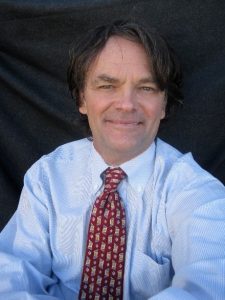 Dr. Daniel Tormey is President of Catalyst Environmental Solutions Corporation. Dr. Tormey is an expert in energy and water and conducts environmental reviews for both government and industry. His practice areas include environmental aspects of oil and gas (hydraulic fracturing, produced water management including injection, pipelines, LNG terminals, refineries and retail facilities); power systems (transmission lines, power generation by wind, solar, natural gas, diesel, coal, nuclear, CO2 sequestration); water resources development (groundwater and surface water supply, hydroelectric power, treatment including reverse osmosis systems, geomorphology and sediment transport); and environmental policy including evolving strategies for climate change quantification and adaptation. He served on the Steering Committee with the California Center for Science and Technology preparing the SB-4 mandated study of the effects of hydraulic fracturing in California and was on the National Academy of Sciences Science Advisory Board for Giant Sequoia National Monument. He has a Ph.D. in Geology and Geochemistry from MIT, and a B.S. in Civil Engineering and Geology from Stanford.
Dr. Daniel Tormey is President of Catalyst Environmental Solutions Corporation. Dr. Tormey is an expert in energy and water and conducts environmental reviews for both government and industry. His practice areas include environmental aspects of oil and gas (hydraulic fracturing, produced water management including injection, pipelines, LNG terminals, refineries and retail facilities); power systems (transmission lines, power generation by wind, solar, natural gas, diesel, coal, nuclear, CO2 sequestration); water resources development (groundwater and surface water supply, hydroelectric power, treatment including reverse osmosis systems, geomorphology and sediment transport); and environmental policy including evolving strategies for climate change quantification and adaptation. He served on the Steering Committee with the California Center for Science and Technology preparing the SB-4 mandated study of the effects of hydraulic fracturing in California and was on the National Academy of Sciences Science Advisory Board for Giant Sequoia National Monument. He has a Ph.D. in Geology and Geochemistry from MIT, and a B.S. in Civil Engineering and Geology from Stanford.
Gustavo Aguirre Jr.
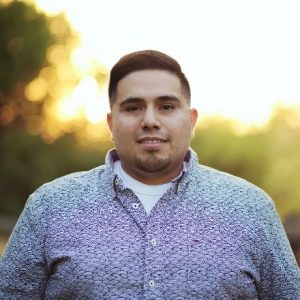 Gustavo Aguirre Jr is the Project Coordinator at Central California Environmental Justice Network (CCJEN). CCJEN works to educate and empower residents, especially focusing on rural communities, to advocate for themselves by providing them with technical assistance and resources. Both of Mr. Aguirre’s parents were migrant farmworkers who traveled from Southern CA to the Central Coast following the seasonal crops. During those years he was exposed to grassroots community organizing and social justice. For the past three years his work has focused on community science data gathering projects and environmental literacy. His work covers issues such as oil & gas development proximal to disadvantaged communities, pesticides exposure, efforts to clean-up super-fund sites, and other environmental justice projects in the Central Valley. Mr. Aguirre has been guest speaker and keynote speaker in various venues including California State University Bakersfield, Bakersfield College, and the University of California at Santa Barbara. He is an experienced advocate with both regulatory agencies such as CalEPA and the California State Legislature. Mr. Aguirre undertook coursework in Chicano History Studies and Communications at Bakersfield College.
Gustavo Aguirre Jr is the Project Coordinator at Central California Environmental Justice Network (CCJEN). CCJEN works to educate and empower residents, especially focusing on rural communities, to advocate for themselves by providing them with technical assistance and resources. Both of Mr. Aguirre’s parents were migrant farmworkers who traveled from Southern CA to the Central Coast following the seasonal crops. During those years he was exposed to grassroots community organizing and social justice. For the past three years his work has focused on community science data gathering projects and environmental literacy. His work covers issues such as oil & gas development proximal to disadvantaged communities, pesticides exposure, efforts to clean-up super-fund sites, and other environmental justice projects in the Central Valley. Mr. Aguirre has been guest speaker and keynote speaker in various venues including California State University Bakersfield, Bakersfield College, and the University of California at Santa Barbara. He is an experienced advocate with both regulatory agencies such as CalEPA and the California State Legislature. Mr. Aguirre undertook coursework in Chicano History Studies and Communications at Bakersfield College.
Jan Gillespie, PhD
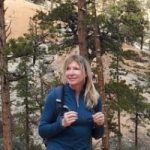 Dr. Jan Gillespie is a geology professor at California State University Bakersfield teaching courses in petroleum and hydrogeology as well as surface and subsurface computer-based mapping skills. She is currently working as a senior research scientist for the US Geological Survey on the regional aquifer monitoring project for California SB4 (the Well Stimulation Bill) with her main task being to map protected aquifers near oil producing areas. She also served as a committee member on the Lawrence Livermore National Laboratory Expert Panel for SB 4 which prepared guidelines for aquifer protection from well stimulations practices. Dr. Gillespie holds a Ph.D. in Geology from University of Wyoming, Laramie, an M.S. in Geology from South Dakota School of Mines and Technology, and a B.S. in Geology from Bemidji State University, Bemidji in Minnesota.
Dr. Jan Gillespie is a geology professor at California State University Bakersfield teaching courses in petroleum and hydrogeology as well as surface and subsurface computer-based mapping skills. She is currently working as a senior research scientist for the US Geological Survey on the regional aquifer monitoring project for California SB4 (the Well Stimulation Bill) with her main task being to map protected aquifers near oil producing areas. She also served as a committee member on the Lawrence Livermore National Laboratory Expert Panel for SB 4 which prepared guidelines for aquifer protection from well stimulations practices. Dr. Gillespie holds a Ph.D. in Geology from University of Wyoming, Laramie, an M.S. in Geology from South Dakota School of Mines and Technology, and a B.S. in Geology from Bemidji State University, Bemidji in Minnesota.
Juan Flores
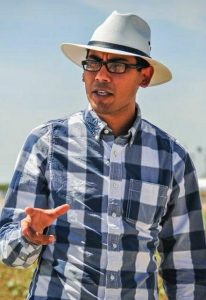 Juan Flores is a Community Organizer for the Center for Race, Poverty, and the Environment (CRPE). Mr. Flores was born in Colima, Mexico and raised in Mexicali, Mexico. He is the proud son of parents who are farm workers in the Central Valley. In 1999 Juan received his permanent residency and, with his parents and siblings, immigrated to Delano, California. At the age of 14, Mr. Flores worked as a farm laborer in the grape fields during the summer months of vacation from Delano High School. Prior to joining CRPE Mr. Flores was a Family Advocate in Delano where he was a childcare advocate for low income families. As an organizer, he has worked on the Climate Justice Campaign in the Central Valley where he as advocated for cleaner ways to drill for the extraction of oil and gas. Mr. Flores' primary role at CRPE is to advocate on behalf of communities that are disproportionally affected by air and water pollution in Kern county. Juan possesses an A.S degree in Medical Assisting.
Juan Flores is a Community Organizer for the Center for Race, Poverty, and the Environment (CRPE). Mr. Flores was born in Colima, Mexico and raised in Mexicali, Mexico. He is the proud son of parents who are farm workers in the Central Valley. In 1999 Juan received his permanent residency and, with his parents and siblings, immigrated to Delano, California. At the age of 14, Mr. Flores worked as a farm laborer in the grape fields during the summer months of vacation from Delano High School. Prior to joining CRPE Mr. Flores was a Family Advocate in Delano where he was a childcare advocate for low income families. As an organizer, he has worked on the Climate Justice Campaign in the Central Valley where he as advocated for cleaner ways to drill for the extraction of oil and gas. Mr. Flores' primary role at CRPE is to advocate on behalf of communities that are disproportionally affected by air and water pollution in Kern county. Juan possesses an A.S degree in Medical Assisting.
Larry Ferini
 Larry Ferini is a fourth generation farmer in Santa Maria, California. For the past 22 years he has owned and operated Rancho Laguna Farms based in Santa Maria, California. His company grows conventional and organic blackberries, strawberries, raspberries, broccoli, cauliflower, kale, iceberg lettuce, and zucchini squash. Before founding Rancho Laguna Farms, Mr. Ferini was a crop production specialist at Bonipak Produce Company in Santa Maria. Mr. Ferini served two terms on the Board of Directors for the Santa Barbara County Fair, 37th Agricultural District. He was appointed to the Santa Barbara County Planning Commission in 2013, he was unanimously reappointed and is currently serving his 2nd term. He and his wife Traci have four children, one of whom is already a fifth generation farmer. Mr. Ferini graduated from Cal Poly, San Luis Obispo with a Bachelors of Science degree in Agronomy and Crop Science in 1985.
Larry Ferini is a fourth generation farmer in Santa Maria, California. For the past 22 years he has owned and operated Rancho Laguna Farms based in Santa Maria, California. His company grows conventional and organic blackberries, strawberries, raspberries, broccoli, cauliflower, kale, iceberg lettuce, and zucchini squash. Before founding Rancho Laguna Farms, Mr. Ferini was a crop production specialist at Bonipak Produce Company in Santa Maria. Mr. Ferini served two terms on the Board of Directors for the Santa Barbara County Fair, 37th Agricultural District. He was appointed to the Santa Barbara County Planning Commission in 2013, he was unanimously reappointed and is currently serving his 2nd term. He and his wife Traci have four children, one of whom is already a fifth generation farmer. Mr. Ferini graduated from Cal Poly, San Luis Obispo with a Bachelors of Science degree in Agronomy and Crop Science in 1985.
Laura Feinstein, PhD
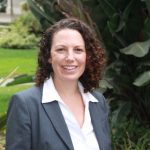 Laura Feinstein has been a Senior Researcher at the Pacific Institute since 2016. She conducts research on access to water and sanitation for disadvantaged communities, the impacts of climate change on water resources, and the water-energy nexus. Prior to joining the Pacific Institute, she was a research scientist and project manager with the California Council on Science and Technology. She also served as a Science and Technology Policy Fellow with the California Senate Committee on Environmental Quality and was a California SeaGrant Delta Science Fellow. Laura holds a Ph.D. in Ecology from the University of California, Davis.
Laura Feinstein has been a Senior Researcher at the Pacific Institute since 2016. She conducts research on access to water and sanitation for disadvantaged communities, the impacts of climate change on water resources, and the water-energy nexus. Prior to joining the Pacific Institute, she was a research scientist and project manager with the California Council on Science and Technology. She also served as a Science and Technology Policy Fellow with the California Senate Committee on Environmental Quality and was a California SeaGrant Delta Science Fellow. Laura holds a Ph.D. in Ecology from the University of California, Davis.
Mary Jane Wilson
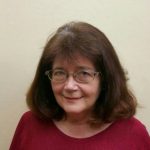 Mary Jane Wilson is President of WZI Inc. Wilson is a Petroleum Engineer and National Registered Environmental Property Assessor. She has worked in all aspects of oil and gas exploration and production engineering, including the area of environmental compliance and permitting. Ms. Wilson has participated in the regulatory process for air pollution control on a national, state, and local level, and has given sworn testimony in regulatory hearings on air pollution control matters. She was a distinguished lecturer for the Society of Petroleum Engineers, was appointed by Congress to advise on the operation of the Naval Petroleum Reserve No.1. She serves on both the National Petroleum Council and the Petroleum Technology Transfer Council. She received her B.S. in Petroleum Engineering from Stanford University.
Mary Jane Wilson is President of WZI Inc. Wilson is a Petroleum Engineer and National Registered Environmental Property Assessor. She has worked in all aspects of oil and gas exploration and production engineering, including the area of environmental compliance and permitting. Ms. Wilson has participated in the regulatory process for air pollution control on a national, state, and local level, and has given sworn testimony in regulatory hearings on air pollution control matters. She was a distinguished lecturer for the Society of Petroleum Engineers, was appointed by Congress to advise on the operation of the Naval Petroleum Reserve No.1. She serves on both the National Petroleum Council and the Petroleum Technology Transfer Council. She received her B.S. in Petroleum Engineering from Stanford University.
Michael S. Bruno, PhD
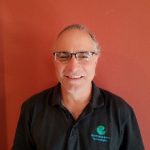 Dr. Michael Bruno is President of Geomechanics Technologies, a Los Angeles based research and consulting company that provides advanced geomechanical analysis, reservoir analysis, and injection well design, permitting, and operations support. Dr. Bruno is a recognized expert and invited speaker in these fields, with more than 40 technical publications. He is a former Society of Petroleum Engineers (SPE) Distinguished Lecturer, a Former Review Chairman for SPE Reservoir Engineering and Evaluation Journal, and a former Chairman of the SPE LA Basin Section. Before founding GeoMechanics Technologies Dr. Bruno spent 13 years working for Chevron Oil Field Research Company, where he held positions of Geomechanics Group Leader and Rock Mechanics Laboratory Manager. He holds a Masters of Engineering degree from Harvey Mudd College and a PhD in Civil (geotechnical) engineering from the University of California Los Angeles.
Dr. Michael Bruno is President of Geomechanics Technologies, a Los Angeles based research and consulting company that provides advanced geomechanical analysis, reservoir analysis, and injection well design, permitting, and operations support. Dr. Bruno is a recognized expert and invited speaker in these fields, with more than 40 technical publications. He is a former Society of Petroleum Engineers (SPE) Distinguished Lecturer, a Former Review Chairman for SPE Reservoir Engineering and Evaluation Journal, and a former Chairman of the SPE LA Basin Section. Before founding GeoMechanics Technologies Dr. Bruno spent 13 years working for Chevron Oil Field Research Company, where he held positions of Geomechanics Group Leader and Rock Mechanics Laboratory Manager. He holds a Masters of Engineering degree from Harvey Mudd College and a PhD in Civil (geotechnical) engineering from the University of California Los Angeles.
Patricia Poire
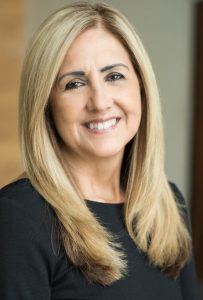 Patricia Poire is the Planning Manager at the Kern Groundwater Authority and currently serves as second vice president of the Kern County Farm Bureau. As part of her work for the Kern County Farm Bureau, she served as one of the lead members of the oil and agriculture committee formed to work on the environmental documents associated with the Oil and Gas Ordinance handled thru the County of Kern Planning Department. Prior to her work on the Ground Water Authority, Poire managed corporate and public affairs at Grimmway Farms from 2008 till 2018. Poire was also appointed to the California Partnership for the San Joaquin Valley Board of Directors by Governor Brown, where she has served since 2017. Her other activities include the Kern County Council of Governments’ Regional Planning Advisory Committee and Kern Economic Development Corporation. She attended University of Pacific and California State University at Bakersfield.
Patricia Poire is the Planning Manager at the Kern Groundwater Authority and currently serves as second vice president of the Kern County Farm Bureau. As part of her work for the Kern County Farm Bureau, she served as one of the lead members of the oil and agriculture committee formed to work on the environmental documents associated with the Oil and Gas Ordinance handled thru the County of Kern Planning Department. Prior to her work on the Ground Water Authority, Poire managed corporate and public affairs at Grimmway Farms from 2008 till 2018. Poire was also appointed to the California Partnership for the San Joaquin Valley Board of Directors by Governor Brown, where she has served since 2017. Her other activities include the Kern County Council of Governments’ Regional Planning Advisory Committee and Kern Economic Development Corporation. She attended University of Pacific and California State University at Bakersfield.
Randy Maddalena, PhD
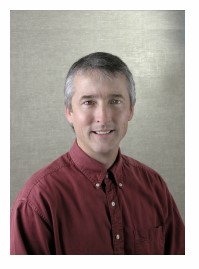 Randy Maddalena, Ph.D., is a Research Scientist in the Indoor Environment Group with the Energy Analysis and Environmental Impacts Division at Lawrence Berkeley National Laboratory. He received his BS in Environmental Toxicology (1992) and Ph.D. in Agricultural and Environmental Chemistry (1998) from the University of California, Davis. The focus of his research at LBNL has been on environmental fate and transport and multi-pathway exposure processes and assessment for organic chemicals combining modeling, bench scale experimentation and field scale campaigns. Randy’s research supports the development, evaluation and application of mathematical models that predict chemical fate in multiple environmental media (air, water, soil, vegetation, sediment) and chemical exposures through multiple pathways (drinking water, food, feed, indoor air, dust) for both human and ecological receptors. His recent research has focused on characterizing indoor pollutant emission sources including office equipment, identifying sources of indoor pollutants in FEMA trailers, characterizing exposure concentrations of insecticides used on passenger aircraft, developing sampling and modeling tools for assessing indoor exposures to semi-volatile organic compounds, characterizing sulfur gas emission from Chinese drywall, quantifying particle emission from Mongolian space heating stoves, characterizing indoor air quality in large commercial spaces (airport terminals), quantifying field scale emission factors at composting facilities and measuring exposures from synthetic turf playing fields. Other research projects focus on testing performance of air cleaning technologies in large spaces and in the transportation industry and general building performance related to indoor air quality.
Randy Maddalena, Ph.D., is a Research Scientist in the Indoor Environment Group with the Energy Analysis and Environmental Impacts Division at Lawrence Berkeley National Laboratory. He received his BS in Environmental Toxicology (1992) and Ph.D. in Agricultural and Environmental Chemistry (1998) from the University of California, Davis. The focus of his research at LBNL has been on environmental fate and transport and multi-pathway exposure processes and assessment for organic chemicals combining modeling, bench scale experimentation and field scale campaigns. Randy’s research supports the development, evaluation and application of mathematical models that predict chemical fate in multiple environmental media (air, water, soil, vegetation, sediment) and chemical exposures through multiple pathways (drinking water, food, feed, indoor air, dust) for both human and ecological receptors. His recent research has focused on characterizing indoor pollutant emission sources including office equipment, identifying sources of indoor pollutants in FEMA trailers, characterizing exposure concentrations of insecticides used on passenger aircraft, developing sampling and modeling tools for assessing indoor exposures to semi-volatile organic compounds, characterizing sulfur gas emission from Chinese drywall, quantifying particle emission from Mongolian space heating stoves, characterizing indoor air quality in large commercial spaces (airport terminals), quantifying field scale emission factors at composting facilities and measuring exposures from synthetic turf playing fields. Other research projects focus on testing performance of air cleaning technologies in large spaces and in the transportation industry and general building performance related to indoor air quality.
Robert B. Jackson, PhD
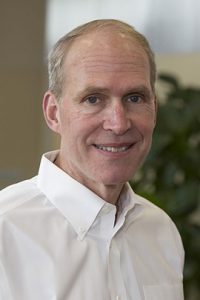 Robert B. Jackson is a Michelle and Kevin Douglas Provostial Professor and chair of the department of Earth System Science in the School of Earth, Energy & Environmental Sciences. He studies how people affect the earth, including research on the global carbon and water cycles, biosphere/atmosphere interactions, energy use, and climate change. Dr. Jackson’s team and his colleagues published the first studies examining hydarulic fracturing and drinking water quality and, with colleagues, mapped thousands of natural gas leaks across cities such as Boston and Washington, D.C. He is also examining the effects of climate change and droughts on forest mortality and ecosystems. Dr. Jackson has received numerous awards. He is a Fellow in the American Association for the Advancement of Science, the American Geophysical Union and the Ecological Society of America and was honored at the White House with a Presidential Early Career Award in Science and Engineering. In recent years, he directed the DOE National Institute for Climate Change Research for the southeastern U.S., co-chaired the U.S. Carbon Cycle Science Plan, and is currently Chair of the Global Carbon Project. Dr. Jackson earned B.S. in Chemical Engineering from Rice University, and M.S. from Utah State University in Ecology Ph.D., Utah State University, and M.S. from Utah State University in Statistics, and, and a Ph.D. from Utah State University in Ecology.
Robert B. Jackson is a Michelle and Kevin Douglas Provostial Professor and chair of the department of Earth System Science in the School of Earth, Energy & Environmental Sciences. He studies how people affect the earth, including research on the global carbon and water cycles, biosphere/atmosphere interactions, energy use, and climate change. Dr. Jackson’s team and his colleagues published the first studies examining hydarulic fracturing and drinking water quality and, with colleagues, mapped thousands of natural gas leaks across cities such as Boston and Washington, D.C. He is also examining the effects of climate change and droughts on forest mortality and ecosystems. Dr. Jackson has received numerous awards. He is a Fellow in the American Association for the Advancement of Science, the American Geophysical Union and the Ecological Society of America and was honored at the White House with a Presidential Early Career Award in Science and Engineering. In recent years, he directed the DOE National Institute for Climate Change Research for the southeastern U.S., co-chaired the U.S. Carbon Cycle Science Plan, and is currently Chair of the Global Carbon Project. Dr. Jackson earned B.S. in Chemical Engineering from Rice University, and M.S. from Utah State University in Ecology Ph.D., Utah State University, and M.S. from Utah State University in Statistics, and, and a Ph.D. from Utah State University in Ecology.
Adam Peltz
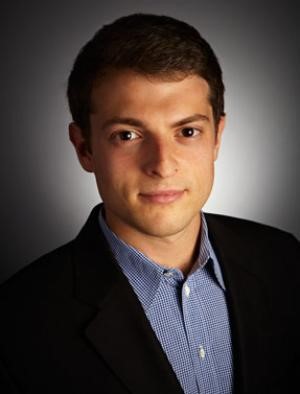 Adam Peltz is a senior attorney at the Environmental Defense Fund. He focuses on oil and gas regulation and policy and serves as a public advocate on oil and gas development issues, with a focus on well integrity. Adam is responsible for managing multi-stakeholder efforts concerning oil and gas development to improve environmental outcomes through enhanced regulation and improved industry practices. Adam holds an A.B. in political science and international studies from the University of Chicago, and a J.D. and an M.A. in international relations from Boston University.
Adam Peltz is a senior attorney at the Environmental Defense Fund. He focuses on oil and gas regulation and policy and serves as a public advocate on oil and gas development issues, with a focus on well integrity. Adam is responsible for managing multi-stakeholder efforts concerning oil and gas development to improve environmental outcomes through enhanced regulation and improved industry practices. Adam holds an A.B. in political science and international studies from the University of Chicago, and a J.D. and an M.A. in international relations from Boston University.
Seth B.C. Shonkoff, PhD, MPH
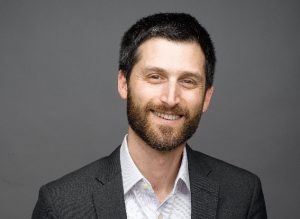 Dr. Seth Shonkoff is the executive director of the energy science and policy institute, PSE Healthy Energy. Dr. Shonkoff is also a visiting scholar in the Department of Environmental Science, Policy and Management at UC Berkeley and an affiliate in the Energy Technologies Area at Lawrence Berkeley National Lab in Berkeley California. An environmental and public health scientist by training, he has more than 15 years of experience in water, air, climate, and population health research and has published dozens of peer-reviewed journal articles and reports. He has worked and published on topics related to the intersection of energy, air pollution, water quality, climate, and human health from scientific and policy perspectives. Dr. Shonkoff has co-authored multiple high-profile scientific assessments including the Human Health chapter of The Intergovernmental Panel on Climate Change (IPCC) Fifth Assessment Report (AR5), two human health assessments in the California Senate Bill 4 independent scientific study on hydraulic fracturing and well stimulation; and a health assessment of underground gas storage facilities in the State of California pursuant to Senate Bill 826. Dr. Shonkoff also serves on multiple science-policy expert panels. Dr. Shonkoff completed his PhD in the Department of Environmental Science, Policy, and Management and his MPH in epidemiology in the School of Public Health from the University of California, Berkeley.
Dr. Seth Shonkoff is the executive director of the energy science and policy institute, PSE Healthy Energy. Dr. Shonkoff is also a visiting scholar in the Department of Environmental Science, Policy and Management at UC Berkeley and an affiliate in the Energy Technologies Area at Lawrence Berkeley National Lab in Berkeley California. An environmental and public health scientist by training, he has more than 15 years of experience in water, air, climate, and population health research and has published dozens of peer-reviewed journal articles and reports. He has worked and published on topics related to the intersection of energy, air pollution, water quality, climate, and human health from scientific and policy perspectives. Dr. Shonkoff has co-authored multiple high-profile scientific assessments including the Human Health chapter of The Intergovernmental Panel on Climate Change (IPCC) Fifth Assessment Report (AR5), two human health assessments in the California Senate Bill 4 independent scientific study on hydraulic fracturing and well stimulation; and a health assessment of underground gas storage facilities in the State of California pursuant to Senate Bill 826. Dr. Shonkoff also serves on multiple science-policy expert panels. Dr. Shonkoff completed his PhD in the Department of Environmental Science, Policy, and Management and his MPH in epidemiology in the School of Public Health from the University of California, Berkeley.
Facilitator
Preston Jordan
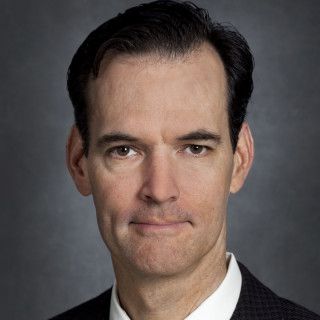 Preston Jordan is a Scientific Research Associate in the Earth Sciences Division at Lawrence Berkeley National Laboratory (LBNL). He received his B.A. in Geology in 1988 and M.S.Eng.Sci. in Geotechnical Engineering in 1997, both from the University of California, Berkeley. He is a California Professional Geologist, Certified Hydrogeologist and Certified Engineering Geologist. Prior to joining LBNL, Jordan worked at a geotechnical engineering consultancy. In his first fifteen years at LBNL he performed paleoseismic research, characterized the geology and hydrogeology of the lab for environmental remediation, and conducted contaminant remediation pilot tests. Over the last decade his research focus has regarded reservoirs in the deeper subsurface with a particular emphasis on risk assessment. He has published on well and fault leakage risk, and led or participated in risk reviews of geologic carbon storage, well stimulation, and underground natural gas storage. His risk review of one of the world’s few commercial-scale geologic carbon storage projects led to a reduction of injection pressures. The well stimulation reviews changed the policy conversation in California. Most of his geologic carbon storage quantification methodology/permanence protocol recommendations were adopted into the California Air Resources Board’s draft regulations for crediting under the low-carbon fuel standard. The Board also adopted a methodology he devised for estimated the mass of methane blown out of well SS-25 in the Aliso Canyon natural gas storage field. He is currently leading the storage subteam of the only funded geologic carbon capture and storage development project in California, and facilitating the Class II underground injection control well program review panel mandated by California Senate Bill 83.
Preston Jordan is a Scientific Research Associate in the Earth Sciences Division at Lawrence Berkeley National Laboratory (LBNL). He received his B.A. in Geology in 1988 and M.S.Eng.Sci. in Geotechnical Engineering in 1997, both from the University of California, Berkeley. He is a California Professional Geologist, Certified Hydrogeologist and Certified Engineering Geologist. Prior to joining LBNL, Jordan worked at a geotechnical engineering consultancy. In his first fifteen years at LBNL he performed paleoseismic research, characterized the geology and hydrogeology of the lab for environmental remediation, and conducted contaminant remediation pilot tests. Over the last decade his research focus has regarded reservoirs in the deeper subsurface with a particular emphasis on risk assessment. He has published on well and fault leakage risk, and led or participated in risk reviews of geologic carbon storage, well stimulation, and underground natural gas storage. His risk review of one of the world’s few commercial-scale geologic carbon storage projects led to a reduction of injection pressures. The well stimulation reviews changed the policy conversation in California. Most of his geologic carbon storage quantification methodology/permanence protocol recommendations were adopted into the California Air Resources Board’s draft regulations for crediting under the low-carbon fuel standard. The Board also adopted a methodology he devised for estimated the mass of methane blown out of well SS-25 in the Aliso Canyon natural gas storage field. He is currently leading the storage subteam of the only funded geologic carbon capture and storage development project in California, and facilitating the Class II underground injection control well program review panel mandated by California Senate Bill 83.


